Disciplinary board, Supreme Court referee at odds over suspension for Jason Ravnsborg
- Oops!Something went wrong.Please try again later.
The State Bar of South Dakota Disciplinary Board and lawyers for Jason Ravnsborg, the former South Dakota Attorney General who was involved in a fatal 2020 car crash that killed a pedestrian, have made formal recommendations ahead of oral arguments expected before the state's Supreme Court next week.
Ravnsborg will be appearing before the court to take on the board at 9 a.m. Wednesday at the state Capitol.
The crux of two court documents obtained by the Argus Leader indicate retired judge Bradley Zell has recommended the former attorney general should not lose his ability to practice, a conclusion at odds with the disciplinary board's view that a 26-month suspension is appropriate.
Instead, Zell, who was appointed by the judicial tribunal in June to furnish a decision on the matter, concluded the court should issue a public reprimand without suspension, the documents read.
The complaint against Ravnsborg, which was filed by Alexis Tracy, the former State's Attorney for Clay County, is centered on the state's Rules of Professional Conduct statute, particularly about whether Ravnsborg's actions fall under various misconduct rules.
Those rules include the following:
committed a criminal act that reflects adversely on the lawyer's honesty, trustworthiness or fitness as a lawyer in other respects;
engaged in conduct involving dishonesty, fraud, deceit or misrepresentation;
engaged in conduct that is prejudicial to the administration of justice;
or stated or implied an ability to influence improperly a government agency or official or to achieve results by means that violate the Rules of Professional Conduct or other law.
Of the four rules Zell weighed in on, the appointed referee found Ravnsborg only violated one, in which he stated or implied an ability to influence improperly a government agency or official or to achieve results by means that violate the Rules of Professional Conduct or other law.
Based on the brief provided by Ravnsborg's attorneys, Zell reviewed three incidents in which Ravnsborg's identified himself as the then-South Dakota Attorney General first rather than by name. That included:
a June 2019 traffic stop in Nebraska,
a July 2020 traffic stop in Iowa,
and the Sept. 12, 2020 911 call following the crash that killed 55-year-old Joseph Boever.
The attorney's brief states the former attorney general did violate one misconduct rule by consistently identifying himself first by his title, as a means of possibly gaining favorable treatment by law enforcement. However, the referee said the effectiveness of this tactic would be "speculation" and "unclear."
In regards to the other three rules at hand, the appointed referee concluded he had no confidence that Ravnsborg was "dishonest, misleading, uncooperative, disrespectful or otherwise conducting himself in a manner not befitting of an attorney."
"This was an extremely unfortunate fatal automobile/ pedestrian accident. Ravnsborg's failure to resign from an elected position, show 'sufficient' expressions of sympathy or condolences to the victim's family, acknowledge publicly culpability, etc., are not standards upon which to administer attorney discipline," Zell wrote.
The disciplinary board holds that Ravnsborg should still receive the 26-month suspension on his law license.
If the court agrees with the board, the former attorney general's suspension would be retroactively prorated back to June 21, 2022, the day the state Senate removed him from office.
The documents put a spotlight on underrepresented aspects of the case.
This includes Zell's findings of fact, conclusions of law and recommendation, as well as original date of the complaint's filings — Sept. 6, 2022, less than two months after his impeachment.
What is the State Bar of South Dakota Disciplinary Board arguing?
In response to Zell's conclusion that the state Supreme Court should not suspend Ravnsborg from practicing as a lawyer, the disciplinary board disagreed for multiple reasons.
On Nov. 13, Zell held a referee hearing in Sioux Falls, where the retired judge asked questions and took the testimony of Ravnsborg on the events leading up to the fatal car crash that killed Boever.
The brief from the disciplinary board paints a picture that, unlike Ravnsborg's hearing with them, which was held on March 30, 2023 in Aberdeen, the hearing before Zell was, at least, less tense.
"The demeanor and presentation by Ravnsborg before Judge Zell was substantially different than what was displayed before the Board," the board's brief reads. "This is difficult to glean from the transcripts but was apparent to those who observed both. Before the Board, Ravnsborg was defensive and dismissive of the Board's role."
In a May 19 state Supreme Court filing, in which the board made the recommendation to strip Ravnsborg of his law license for a time, Ravnsborg's perspective on the board's investigation into his conduct was based in a "political conspiracy." It was only after "persistent prompting from the Board" that Ravnsborg was dissuaded from the thought.
Still, the board contends the former attorney general's behavior during the March hearing was one of "self-promotion as opposed to giving pertinent information to the Board about his background."
Disciplinary board: 'Ravnsborg's conduct left a black eye on the legal system'
The board's brief later distinguished certain parts of Ravnsborg's testimony as "troubling."
Specifically, the state's Rules of Professional Conduct, which encompass lawyer misconduct, were an afterthought in the mind of Ravnsborg, the board asserted.
"Ravnsborg told the Board he had only briefly reviewed the Rule prior to the hearing," Ravnsborg said. "He also indicated that he never thought about the Rules of Professional Conduct throughout the ordeal which ultimately led to his impeachment."
Ravnsborg was also questioned by the board about why he consistently identified himself by his Attorney General position when interacting with law enforcement, the document states.
The former attorney general, according to the document, answered that he felt it was easier to refer to himself as "attorney general" on account of wanting to avoid confusing others with the spelling of his surname.
"[I] didn't get a course on etiquette about when you are supposed to say you are the Attorney General and when you are not," Ravnsborg said. "It is just who I was at the time, it was more of an identifier, not that I was trying to gain favor for it, it's just this is who I am, because again, my name does suck. Sorry, Dad."
Ravnsborg was asked by Zell in November a similar question, though the board found his answer "more evasive."
To the retired judge's question, which was focused on the board's struggle to understand Ravnsborg's use of "attorney general" as an identifier, the man addressed his 911 call following the accident involving Boever.
"I was seeking to get help to - - [sic] I just had an accident. You're calling to get assistance. I have had a lifetime of people not being able to say my name," Ravnsborg told Zell. "And the first thing they do is, 'Well, can you spell that for me?' Well, I didn't want to take the time to spell it."
In this, the board and Zell both agree Ravnsborg had no reason to introduce himself as the state's Attorney General when stopped by law enforcement "if it is not to seek favorable treatment."
"The actual stops and context provide a different perspective. If the Board and Referee Zell found as much, imagine the view of the public," the board wrote. "Ravnsborg's conduct left a black eye on the legal system."
Continuing with Ravnsborg's testimony, the board makes a second argument that, although having previously conceded the point, the former attorney general demonstrated his belief the complaint, the board's recommendation and the disciplinary process were political motivated.
According to the court document, which cites the transcript of the board hearing, Ravnsborg "felt there was a need to prosecute someone with money which never happened.
Similarly, the board cites the Zell hearing transcript, in which Ravnsborg told the judge he believed Tracy filed the original complaint "to further her career."
"Ravnsborg even went so far as to suggest that the complainant violated Board rules by not submitting a response to his initial reply to the Board," the board noted.
Zell and the board disagreed on whether Ravnsborg was truthful when speaking with investigators.
The board's assessment of Ravnsborg, as regards his interview with North Dakota investigators in the weeks after his fatal car crash, was that the Yankton attorney was not truthful with said investigators.
Based on previous Argus Leader reporting, then-attorney general had told the investigators he was not using his cellphone while traveling from Redfield to Pierre the night of the crash, and that he'd not become aware that what he'd struck was a human until the following day when he returned to the crash scene.
However, North Dakota Bureau of Criminal Investigation Agent Joe Arenz said cellphone forensics showed he'd been looking at news articles during the drive. The detectives said they also determined he was lying about when he discovered the body based on an inadvertent admission made during the second interrogation.
"Although Ravnsborg argued the inconsistencies were mistaken memory or his recollection of the accident, the Board found the statements lacked openness and candor and, in this case, was conduct which impugned the integrity of the legal profession as a whole," the board said.
The board also expressed concern about Ravnsborg's conduct regarding Boever and his family. Their brief indicates that, while Ravnsborg publicly stated he attempted to reach out to victim's family, this never happened, "primarily due to his advisors telling him not to do so."
"Even after the civil, criminal, and political decisions had been finalized, Ravnsborg's response to the Board was that the accident changed 'my life,'" the board said. "The Board concluded that comments such as this displayed an attitude lacking remorse and sincerity. Their view is different than Judge Zell which was likely influenced by Ravnsborg's different demeanor before Judge Zell."
Judge Zell rules of conduct
According to the brief, Zell made the recommendation to not suspend Ravnsborg's practicing license, in part because his accident and post-accident conduct was unrelated to legal career.
The board disagreed. They argued misconduct can be considered violations of the state's conduct rules regardless of whether it occurs in one's personal or professional capacities.
The board pointed to cases in Kansas and Nebraska, in which the states' Supreme Courts found that attorneys may be subjected to discipline for conduct unrelated to a lawyer's practice.
Judge Zell discipline
In the board's third and final argument, the council argued Zell skimmed over the disciplinary process, and viewed it instead as one of many "punishments" for Ravnsborg.
During the March hearing, board members outlined to Ravnsborg "its duty" when considering disciplinary measures over misconduct, with a view that the legal system as a whole was impugned.
The board continues that Ravnsborg "could not acknowledge that his conduct and not politics was the main reason he was before the Board."
However, "Zell did not address this, and the Board felt strongly that Ravnsborg's lack of awareness of how his conduct impacted the legal profession was in and of itself indicative of Ravnsborg's overall erroneous perception that he was somehow a victim."
In other out-of-state comparisons, the board looked to former Ohio Attorney General Marc Dann, who was suspended for six months by the state's Supreme Court in 2012. According to The Columbus Dispatch, Dann's service in office was plagued by scandals, including allegations two female employees were sexually harassed by a manager in his department, as well as his own extramarital affair and mishandling of campaign funds for personal use, the last of which resulted in two misdemeanor convictions.
"Like the Ohio Supreme Court, the Board was notably concerned about the impact on the legal system and felt compelled to let it be known that the image of the legal system, the profession and the bar association are of great importance," the board said. "The fact that Ravnsborg was a public official was an aggravating factor which influenced the Board's recommendation."
The board also related Ravnsborg's ordeal to that of William Janklow, former South Dakota attorney general and four-term governor of the state.
In a similar fashion to Ravnsborg, Janklow's political career came to an end when he struck a motorcyclist with his car after running a stop sign while speeding in August 2003. A U.S. Representative for South Dakota at the time, he resigned from his congressional seat on Jan. 20, 2004 after being found guilty of second degree felony manslaughter and three misdemeanors, including speeding, running a stop sign and reckless driving by a Moody County jury.
Janklow's law license was suspended by the South Dakota Supreme Court on Dec. 15, 2003, one day after he was convicted.
In a case that came before the state Supreme Court in October 2005, the State Bar's Disciplinary Board recommended Janklow should have his law license suspended for a 26-month prorated period. It was later reinstated in January 2006, about a month before the suspension would formally expire.
"In Janklow, this Court did not feel compelled to protect the public from fraudulent or dishonest acts of Janklow in his capacity as a lawyer," the board said in its Ravnsborg brief. "They did, however, feel that the damage his conduct caused to the integrity of the legal system must be considered."
The board argued its 26-month suspension recommendation follows precedent.
The cumulative effect of Ravnsborg's conduct should not be set aside, but rather serve as a basis for appropriate discipline consistent with the discipline ultimately received by William Janklow," the board wrote.
Ravnsborg brief
Lawyers representing Ravnsborg, in a separate brief, align the majority of their argument that the former attorney general did not violate conduct rules with Zell's view on the matter.
Based on Zell's findings that three out of four professional conduct rules being weighed were broken by Ravnsborg, the former attorney general's lawyers argued any perception their client acted dishonestly or disrespectful is not related to his legal professional.
Zell, likewise, concurred: "[A]ll of this 'perceived' conduct is of Ravnsborg the person who happens to be an attorney, and not Ravnsborg the practicing attorney."
However, on the one item the board and Zell agree upon — Ravnsborg's use of his title of attorney general in an attempt to curry favor with law enforcement — the lawyers disagree.
The attorneys related the suspension of Deuel County State's Attorney Bert Olson in 1995.
Two years prior, Olson faced drug charges after he was found to be growing marijuana at his home.
Among his home-grown cache, investigators found one box of marijuana plants with the words "immunity granted" and his name etched on one side.
Ravnsborg's lawyers explained, in this case, Olson attempted to use his office to circumvent drug possession charges, "jokingly or otherwise."
However, based on the reasons given by Ravnsborg as to why he identified himself by title — that his surname "sucks" — and the video evidence of his traffic stops, his attorneys argued it is not certain the man tried to influence others.
"The officers in Nebraska and Iowa did issue Respondent warning citations. However, there is no evidence that Respondent's references to his title had any causal relationship to the independent decisions of the officers to issue a warning," the lawyers wrote.
Context
Ravnsborg’s impeachment, the first in South Dakota’s history, unfolded in the state Senate and was based on two articles, including crimes causing death and malfeasance in office.
The decision to impeach came from the Senate after Ravnsborg’s involvement in a Sept. 12, 2020, car crash that killed 55-year-old Joseph Boever.
In August 2021, Judge John Brown found Ravnsborg guilty of two class 2 misdemeanors after the attorney general took a plea deal that allowed him to plead no contest to driving outside his lane and driving while using an electronic device.
The state dropped a third charge of careless driving.
The Crash
The fatal crash took place around 10:30 p.m. Sept. 12, 2020, when Ravnsborg was travelling to his home in Pierre from a political function in Redfield in a 2011 Ford Taurus, according to past Argus Leader reporting.
According to police investigations, Ravnsborg was going westbound on U.S. Highway 14 and was passing through Hyde County when his vehicle went outside the lane markings and struck Boever, who had been walking beside the roadway with a flashlight in hand to get to his truck near the city of Highmore when he was killed that night.
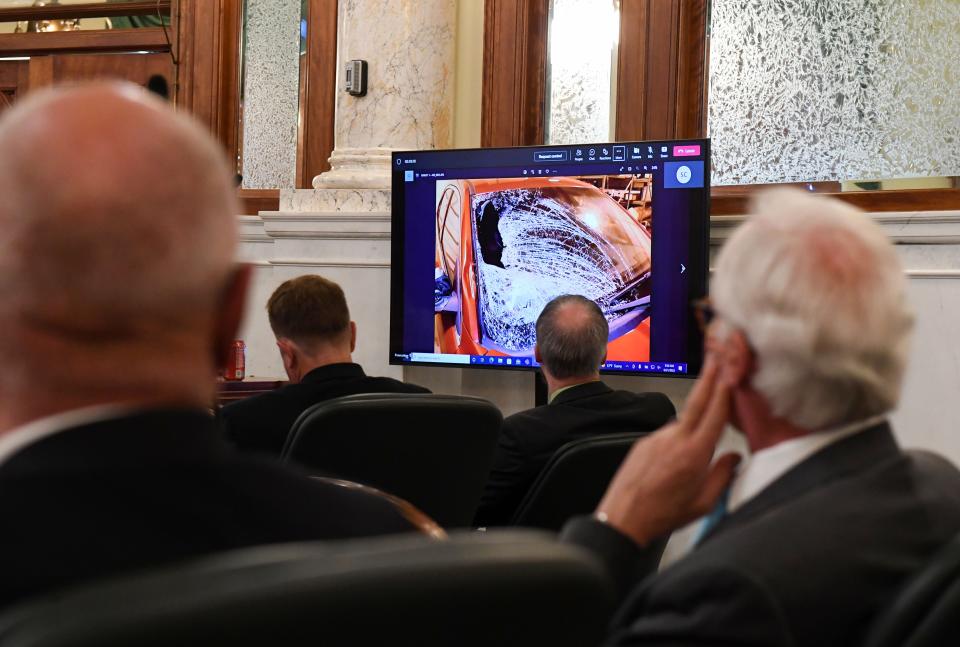
Boever’s body was found in a ditch the next morning.
Ravnsborg made a call to 911 moments after the collision took place, saying he wasn’t sure what he had collided with, according to police. He said he thought it was a deer and didn’t realize it was a human being till the body was found in the ditch the next morning.
However, he did not provide an explanation for why his car had departed from the lane, according to the investigations. And the fact that his car was outside the lane at the time of impact was contrary to the information he provided when he called 911 that night.
The Investigation
The crash investigation was led by out-of-state investigators that South Dakota Highway Patrol brought in to examine crash circumstances. This was because Ravnsborg himself was in charge of the South Dakota Division of Criminal Investigation at the time, a body which investigates matters involving public officials and law enforcement.
Through investigation, it was determined that Ravnsborg had been distracted while driving that night, but the exact cause and nature of distraction was unclear and not disclosed. Police also said that Ravnsborg had been using his phone while driving that night, but not at the time when the crash took place.
It was also determined during the investigation that Boever’s face had made impact with Ravnsborg’s car’s windshield after Boever’s glasses were found inside the car by police, an importance piece of evidence in the case. However, Ravnsborg continued to maintain for months after the crash that he didn’t realize he had struck a human until the morning after.
According to Pennington County State’s Attorney Mark Vargo's and Clay County State’s Attorney Alexis Tracy’s case as presented in the impeachment trial to the 33 out of 35 senators in attendance, the “more important” concern was how Ravnsborg had displayed a pattern of abuse of power since the incident.
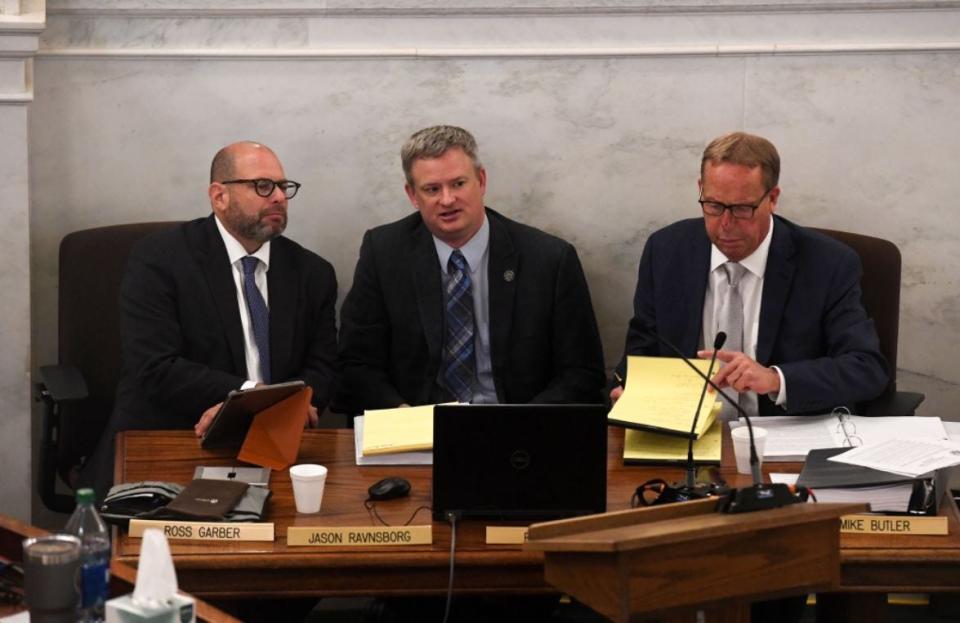
In opening arguments the day of the trial, Tracy disclosed how the then attorney general had made use of state resources to get information related to the crash investigation. He had also identified himself by his position in office to law enforcement officers and 911 dispatchers that night as well as in police encounters before and after the crash took place, she said.
“A man lost his life due to the attorney general’s distracted driving. The seconds, minutes, hours, days, weeks and beyond this transpired, (he) has had countless occasions to do the right thing and at virtually every opportunity, he has chosen not to,” Tracy said in the trial. “He’s used his title in an attempt to gain influence, lied, misled and misdirected law enforcement officers, committed crimes of dishonesty, utilized resources within (his) office for his own personal gain in this criminal investigation.”
The Impeachment
The impeachment trial, a first in South Dakota’s history, took place in two 12-hour-sessions on June 21 and June 22 of 2022, where the Senate voted to convict and remove Ravnsborg from office. Led by Vargo and Tracy on the prosecutors’ side, the trial took place months after state Gov. Kristi Noem had formally asked Ravnsborg to resign from his position as attorney general.
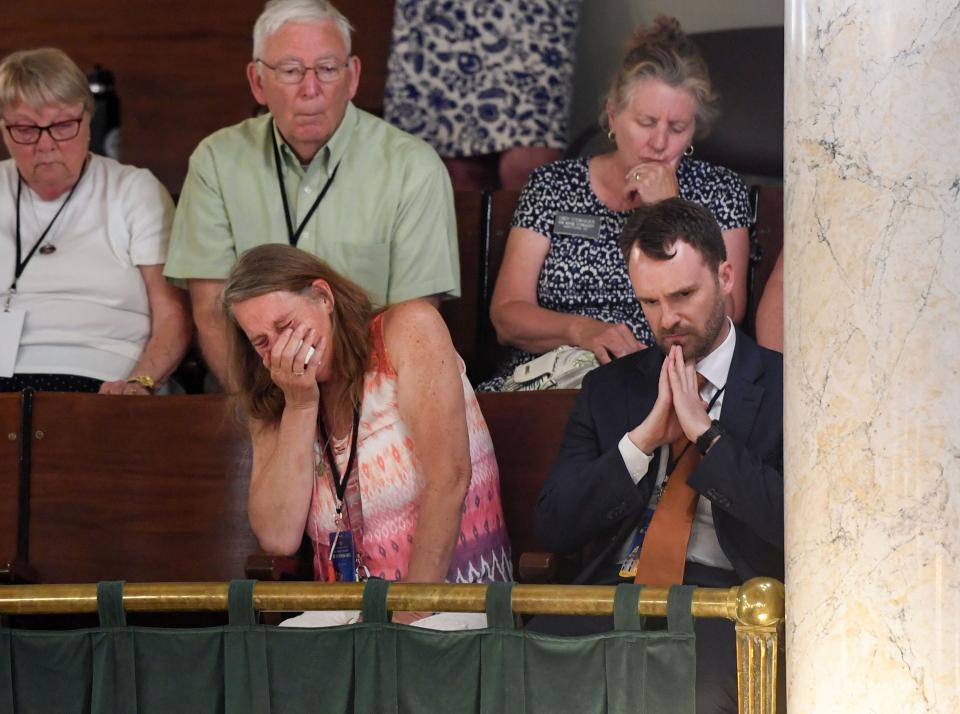
In the days and months after the crash, the governor had made her disappointment with the pace of the slow investigation clear, saying they were making inquiries on a regular basis but had not received any answers. About three months after the crash, she expressed her unhappiness to the Argus Leader about South Dakotans still not knowing if their attorney general was going to be charged criminally.
“I share the South Dakotans’ frustration about the amount of time (this) has taken,” she said. “To have more than 100 days go by without resolution on this is a disservice to the victim’s family.”

Ravnsborg, on the other hand, was attempting to convince the public of his innocence. About three months after the crash, on Dec. 16, 2020, he spoke publicly for the first time after the incident and told media members he was confident he hadn’t committed a crime that night.
“I believe I have not committed any crime,” he said. “I believe that we will, when we have all the facts, not a selected amount of facts, know the full story and we’ll make a full statement.”
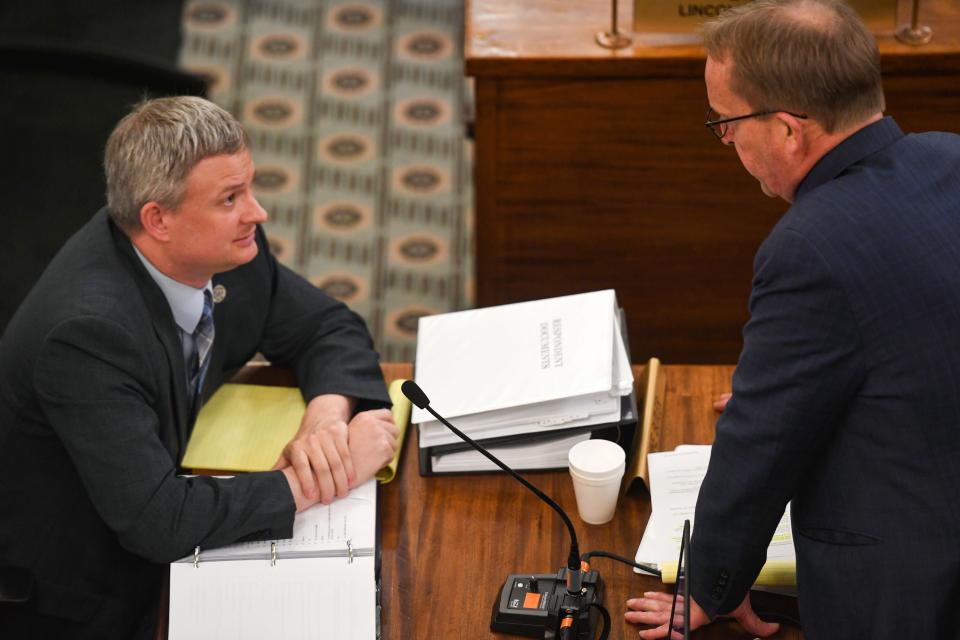
Once the impeachment decision took place which removed Ravnsborg, 46 at the time, from his post as attorney general, a second vote was cast on whether he should be permanently disqualified from “holding any office of trust or profit” in South Dakota. This decision also came out against Ravnsborg.
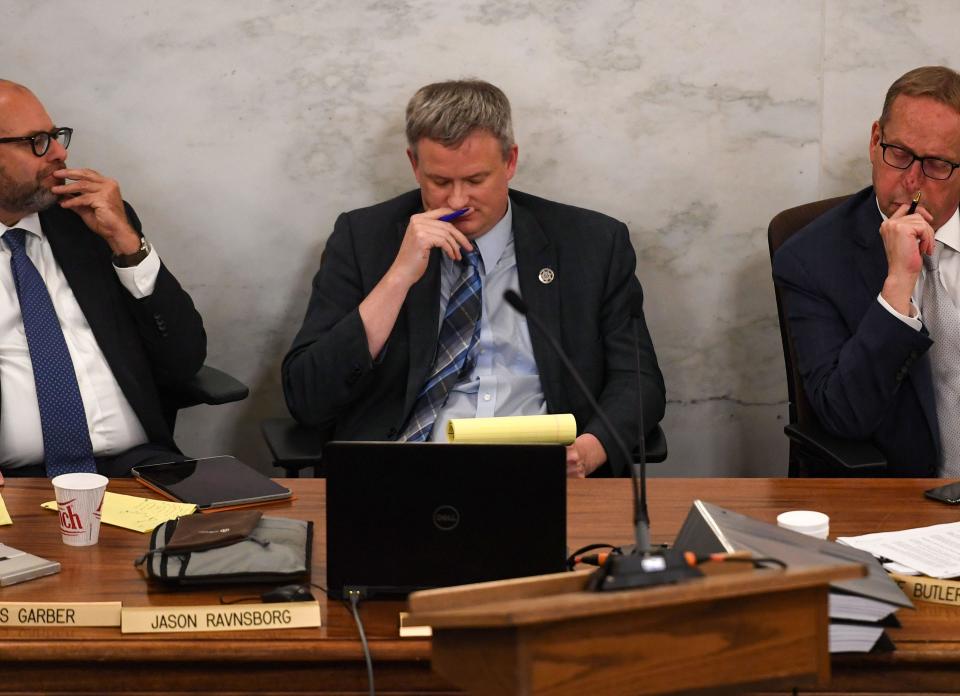
Although the first-ever impeachment trial in South Dakota took place in June 2022, Ravnsborg had been suspended from his duties since April that year when the two articles of impeachment were passed down. This was after months of numerous public officials making formal statements about how it was the honorable thing for the then attorney general to resign from his post and that he did not belong in that office anymore. Through it all, Ravnsborg’s spokespeople responded by saying he had no intention of resigning.
The impeachment decision required the result of a two-thirds majority vote for each of the two impeachment articles, crimes causing death and malfeasance in office. The articles had been passed by South Dakota House of Representatives earlier that year.
At the trial, defense attorneys Mike Butler and Ross Garber, the latter a nationally renowned legal expert in political investigations and impeachments, accepted the wrongdoings of their client since the crash had occurred but maintained that it did not merit his removal from office. However, the Senate saw more weight to the prosecutors’ arguments.
The Senate voted 24 to 9 in favor out of 35 votes on the first article of impeachment of crimes causing death and the removal of Ravnsborg from his post, and 31 to 2 in favor out of 35 votes for the second article of impeachment of malfeasance in office.
Breaking News Reporter Prerana Sannappanavar contributed to this report.
This article originally appeared on Sioux Falls Argus Leader: State bar recommends Jason Ravnsborg's law license be suspended

